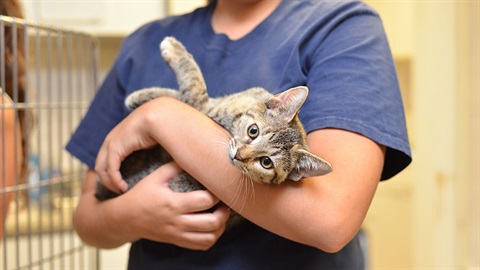Our animal initiatives

We are working to reduce the number of dog attacks, increase the number of pets registered and micro-chipped, and reduce euthanasia rates.
We are educating the community about responsible pet ownership and have a number of initiatives that are working to:
- reduce the number of dog attacks
- increase the proportion of pets registered and micro-chipped, and
- reduce euthanasia rates
Some of our initiatives include:
- A lost and found Facebook page that is helping to reunite owners with their pets - Darebin Lost Animals.
- Partnering with rescue groups so they can rehouse more animals and extending the holding period at our pound service provider.
- Educating the community about responsible pet ownership, including the benefits of desexing, registration and micro-chipping.
- The creation of a Rescue Officer position.
Sadly, there will always be a high number of unwanted or abandoned animals in the community which means there will always be animals that can't be rehomed. Examples include feral cats that kill native animals, diseased animals or dangerous dogs that pose an unacceptable risk to people an their pets. You can also help by choosing to adopt a pet from a reputable animal shelter or rescue group.
Domestic Animal Management Plan
We sought community feedback on dog and cat management in August and we're now drafting our new Domestic Animal Management Plan (2026-2029).
To find out more and when you can view our draft Plan visit Your Say Darebin.
Our Domestic Animal Management Plan outlines how we manage domestic animals (pets) in the City of Darebin, and the animal management services we provide.
The plan outlines how we promote responsible pet ownership and manage nuisance animals, dog attacks and pet registrations within the community.
Victorian councils are legally required to prepare and implement a Domestic Animal Management Plan every 4 years.
Our current Domestic Animal Management Plan was adopted in February 2022.
View the 2022 Domestic Animal Management Plan(PDF, 3MB)
Animal collection statistics
Animals found in Darebin which cannot be identified through a microchip or pet registration are taken to our pound, the wat djerring Animal Facility (previously known as Epping Animal Welfare Facility).
The wat djerring Animal Facility has an 8-day stray period for any pet owners to come forward and reclaim their animal. If an animal does not have an owner or the owner wishes to relinquish ownership of their pet, then the animal is assessed for rehoming.
Unfortunately, some found animals can't be re-homed, such as wild or diseased cats and dangerous dogs.
Dogs that are euthanised are those identified as not suitable for re-homing after undergoing a behavioural assessment, those that have been surrendered to us for behavioural issues, or as a result of a court action.
Cats that are euthanised are those identified as not suitable for re-homing after undergoing a behavioural assessment, or those that are deemed feral or diseased.
- 2014—15 Animal Statistics(PDF, 108KB)
- 2015—16 Animal Statistics(PDF, 115KB)
- 2016—17 Animal Statistics(PDF, 115KB)
- 2017—18 Animal Statistics(PDF, 125KB)
- 2018—19 Animal Statistics(PDF, 385KB)
- 2019—20 Animal Statistics(PDF, 81KB)
- 2020—21 Animal Statistics(PDF, 107KB)
- 2021—22 Animal Statistics(PDF, 109KB)
- 2022—23 Animal Statistics(PDF, 103KB)
- 2023 - 24 Animal Statistics(PDF, 132KB)
- 2024 - 25 Animal Statistics(PDF, 133KB)
The wat djerring Animal Facility
Previously known as the Epping Animal Welfare Facility, the wat djerring Animal Facility is a vital organisation that provides care and shelter for lost, abandoned and neglected animals throughout Whittlesea, Merri-bek and Darebin council areas. This facility is dedicated to providing a safe and nurturing environment for all animals, and their efforts have made a significant impact on the lives of many animals in need.
The wat djerring Animal Facility is staffed by trained professionals who are committed to providing the highest level of care for every animal that comes through their doors. They provide medical attention, proper nutrition, and exercise to ensure that every animal is healthy and happy during their stay. The staff is also responsible for ensuring that every animal is well-socialised and receives the love and attention they need to thrive.
In addition to their excellent care for animals, wat djerring Animal Facility is also committed to finding forever homes for their animals. They work tirelessly to match animals with loving families who are committed to providing them with a safe and caring home. This includes providing education and resources to potential adopters to ensure that they are equipped to handle the responsibility of owning a pet.
Animals are available for viewing by appointment and online adoption applications via the button below.
See our pets available for adoption
Animal rescue organisation partnerships
We have developed a number of community animal rescue organisation partnerships to support the most vulnerable animals.
Orphaned kittens
We have implemented a Neonate Rescue Program for orphaned kittens weighing 500 grams or less. These kittens are referred to our dedicated rescue partners who have specialised foster carers who can provide the care they need. The kittens are raised by the foster carers and then made available for adoption through their adoption programs.
For more information on our rescue partners, see our Adopt a pet page.